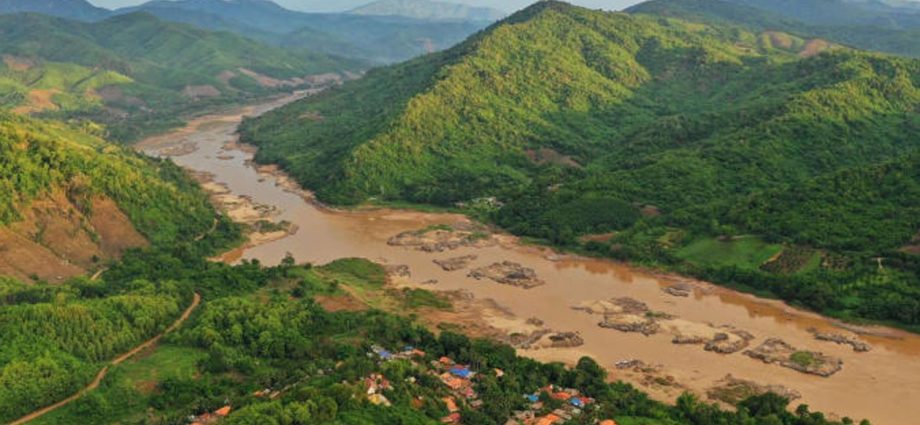
Environmentalists have raised concerns about a 100-billion-baht dam project on the lower section of the Mekong River in Laos, warning of adverse effects on the livelihoods of those living on both sides of the Thai-Lao border.
The Pak Beng hydropower dam project is one of 11 planned for the lower Mekong.
It is part of Laos’ economic strategy to become the “Battery of Southeast Asia” by selling hydropower to neighbouring countries.
Located in Pak Beng district, Oudomxay province, about 90 kilometres from the border with Chiang Rai, the run-of-river dam will be designed to produce 912 megawatts of electricity.
Work is expected to take eight years, with electricity sales to the Electricity Generating Authority of Thailand (Egat) slated to begin in 2033.

Cross-border impacts
A transboundary environmental impact assessment (TBEIA) has been underway to study the dam’s potential effects on both countries, with findings to be presented to Egat before financing is finalised.
However, local communities, academics, and civil groups in Thailand have opposed the project for years, citing inadequate public consultation and outdated environmental studies.
Pianporn Deetes, regional campaign director of International Rivers, said a recent survey showed work on the dam had not yet begun, apart from a bridge and access roads.
In Laos, authorities have told residents of impending relocations to accommodate the dam.
Ms Pianporn criticised the environmental study supporting the project as outdated and said it underestimated the number of people likely to be affected.
She also noted insufficient public participation in planning and raised concerns about higher electricity bills in Thailand resulting from Egat’s 29-year power purchase agreement.
“Banks providing loans are waiting for the TBEIA results. We hope the study addresses broader impacts, ensures stakeholder participation, and considers rising electricity costs,” she said.

Pianporn: Building has not yet begun
Flooding and ecology
Flooding is another major concern.
Severe floods in northern Thailand, including Chiang Rai, in recent months have heightened fears the dam could worsen future flood scenarios by slowing the flow of Mekong tributaries.
Ms Pianporn added that civil groups have asked for a mathematical model to assess potential flooding impacts on residents and farmlands but have received no response.
Locals in Chiang Rai’s Chiang Khong, Wiang Kaen, and Chiang Saen districts have voiced fears about water backing up from the dam, which could inundate homes and farmland.
Legal and governance challenges
Sor Rattanamanee Polkla, a lawyer with the Community Resource Centre, highlighted legal loopholes in Thai law, which lacks requirements for transboundary impact assessments.
The Supreme Administrative Court rejected an appeal against the dam in 2021, ruling Thailand has no jurisdiction over projects in Laos.
“This legal gap shows Thailand cannot govern projects outside its borders, even when they affect Thai communities,” she said, adding the TBEIA is being conducted under Lao laws, raising concerns about the scope and inclusivity of the study.
After the lower court rejected their case, the groups appealed to the Supreme Administrative Court.
However, the court ruled Thailand does not have a law requiring transboundary impact assessments, and so has no jurisdiction over projects located within Laos.
Ms Sor Rattanamanee said the transboundary environmental impact assessment (TBEIA) will be submitted to Lao authorities for approval.
It is unclear to what extent ordinary Thais as opposed to Egat will get a say in the process, especially as they lack jurisdiction, she said..
“We do not know how the TBEIA is being conducted or to what extent it will cover impacts on Thailand,” she said.

Sor: Little Thailand can do
Call for wider impact assessments
Hannarong Yaowalers, an adviser to the Thai Water Partnership Foundation, stressed the importance of incorporating feedback from all stakeholders.
He criticised the TBEIA for focusing only on areas near the site in Laos and neglecting areas in Thailand which could also be affected, such as Chiang Khong and Wiang Kaen districts in Chiang Rai.
“Egat must ensure the TBEIA covers broader assessments, including impacts on fisheries, natural resources, and social issues, as part of its power purchase agreement requirements,” he said.
“As far as we know, Egat does not include these as part of its requirements,” Mr Hannarong said. Activists would keep an eye on progress to make sure their concerns were addressed.
Critics also said the planned purchase of electricity was unnecessary as the country has more than enough power in reserve.
Energy demand questioned
Critics argue the additional power that would be generated by the dam is unnecessary.
Surichai Wankaew, an emeritus professor at Chulalongkorn University, said Thailand already has 69% of power in reserve.
The Pak Beng project continues to face scrutiny from civil groups and environmental advocates, who are urging authorities to reconsider the dam’s long-term implications for the region’s ecology, livelihoods, and energy needs.
The Mekong River Commission (MRC) is an intergovernmental agency that collaborates with the governments of Laos, Cambodia, Thailand, and Vietnam to manage the Mekong’s resources.
Advocacy groups have criticised an original community survey by Thai agencies for being flawed in terms of legal compliance, lacking adequate assessments of transboundary environmental, health, and social impacts.

Hannarong: Feedback essential

